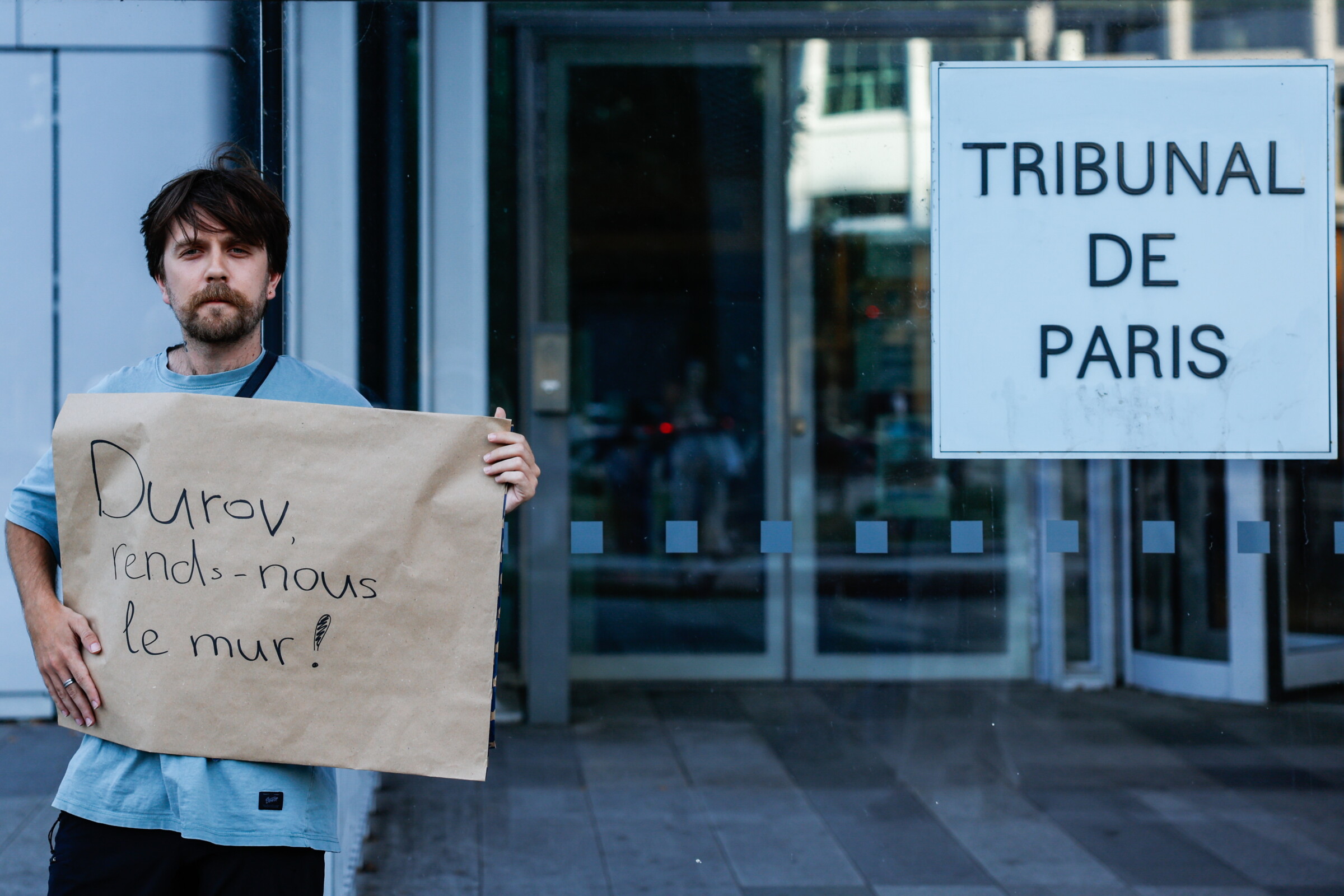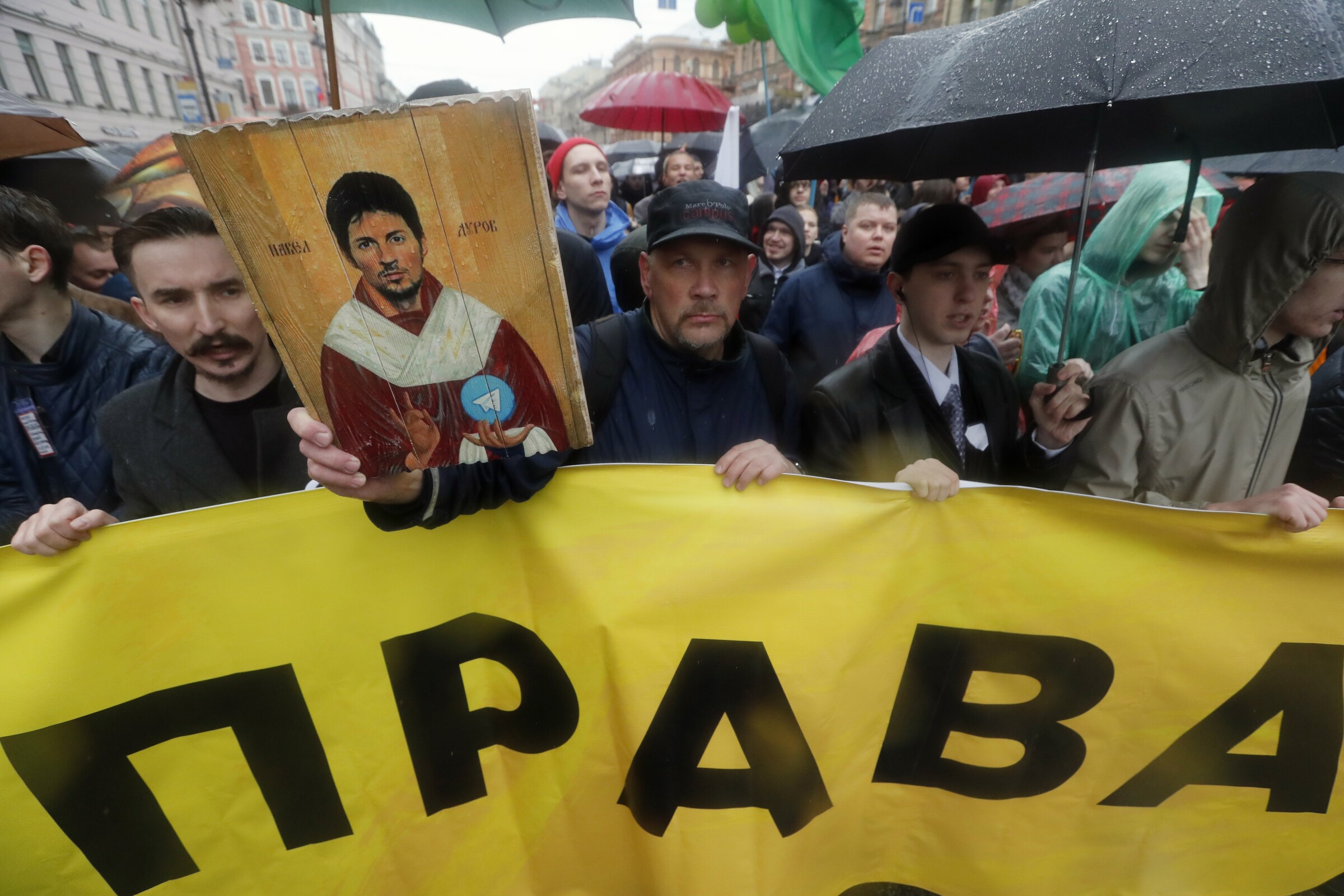Pavel Durov’s recent arrest in Paris, the founder and CEO of Telegram, brings into focus the platform’s use by extremist groups and organised crime. Experts in internet security and freedom issues, along with Durov’s former spokesperson, speak to iMEdD.
On the evening of Saturday, August 24, 2024, the avatar of a hooded dog with a white snout and black nose flooded X – formerly Twitter. The so-called “Resistance dog” or “Spotty” had first appeared in 2011, when Pavel Durov, then founder of the Russian social networking platform VKontakte (the so-called “Russian Facebook”), had refused to censor Russian opposition posts at the request of the FSB intelligence agency.
In 2013, before he left Russia, Durov founded Telegram, the messaging platform that gained considerable popularity across the former Soviet bloc. However, the founder and CEO of the platform was officially accused by French judicial authorities of not taking measures to limit its use by members of criminal organisations. On August 24, Durov was arrested on a French warrant at Le Bourget airport, about eleven kilometers northeast of Paris. And the avatar of the “Resistance dog,” considered by many to be a symbol of free speech, once again flooded the Internet.
The controversial Pavel Durov, now 39, was born in Russia and has been a resident of Dubai for the past few years. He holds citizenship in both France and the United Arab Emirates. Telegram currently boasts 950 million active users worldwide, and Forbes estimates the fortune of the “Russian Zuckerberg” at $15.5 billion.
Durov presents an unconventional image on social media, always dressed in black and leading a solitary life, abstaining from meat, alcohol, and even coffee. He avoids interviews with mainstream media, yet last spring he agreed to speak with the ultra-conservative American journalist Tucker Carlson.
“People love independence. They also love privacy and freedom—(there are) many reasons why someone might switch to Telegram,” he said in the interview. “I’d rather be free than take orders from anyone,” he noted, referring to his flight from Russia.
Moscow initially tried to block Telegram, but without success. The messaging service is currently used by both the Russian government and the opposition, with some channels boasting hundreds of thousands of subscribers.
From the outset, the platform became very popular among dissidents of all kinds and those seeking to communicate under the radar of security services for various reasons. In the following years, however, Telegram faced criticism for allegedly failing to cooperate with law enforcement authorities in serious cases of drug trafficking, child pornography, and fraud.

The shadowy world of Telegram hooligans

The Bad Blue Boys, hooligans associated with Croatian club Dinamo Zagreb, have links to organized fans from Ukraine and Greece. An in-depth investigation conducted by iMEdD delved into numerous public channels and social media profiles to uncover the connections between organized fans from Croatia, Ukraine, and Greece, as well as their affiliations with far-right ideologies.
Quietly Open for Business
In a recent Stanford Law School podcast, former Facebook chief security officer Alex Stamos stated that while illegal activities can be detected across online platforms, Telegram is “the only one that intentionally allows people to use their platform for really bad, harmful, illegal purposes. Nobody else does this intentionally.”
Daphne Keller, Director of the Program on Platform Regulation at Stanford’s Cyber Policy Center, participated in the aforementioned podcast. “For a long time, Telegram has been rumoured to deliberately turn a blind eye to illegal activities and expressly refuses to hand over data to law enforcement. That makes it a reasonable destination for criminal use,” Keller told iMEdD.
Giovanni de Gregorio, Associate Professor in the Department of Law and Technology at the Católica Global Law School in Lisbon, explained to iMEdD that the platform is not responsible for content published by third parties. “However, if it is aware of such content— given that Telegram has frequently been aware of activities occurring on its platform but has not acted to prevent such behaviour —then this could result in the platform being held liable.”
Following Pavel Durov’s arrest in Paris, Telegram issued a statement claiming that all relevant laws were upheld and called it absurd to hold the owner of a platform accountable for its misuse. There is one crucial detail.
Among the terms of service for the EU, as referenced on its website, are stipulations that users shall not promote violence, pornographic material, or other illegal activities, such as drug and weapon trafficking, in public channels or other public media on Telegram. According to Stamos, the use of the term “public” is intentional.
As he stated in the Stanford podcast: “They’re the only major platform that implicitly allows illegal activity on their platform as long as it’s not in public surfaces […] They don’t have to say the word public […] They did not have to add a qualifier […] So they pretty much advertise, we are open for business as long as you keep it a little bit quiet.”
Telegram did not respond to iMEdD’s questions regarding the use of the word “public” in the aforementioned section of its terms of service.
George Lobushkin, a former press secretary for Telegram’s founder who remains close to him, commented on Durov’s arrest to iMEdD. In a written statement through the platform, he expressed his belief that the charges are fabricated.
“Telegram has always complied with the requirements of the jurisdiction in which it operates. Any major platform faces the claims that are made against Durov. But never has a CEO [of a major platform] been arrested so treacherously,” Lobushkin wrote. “My purely personal opinion is that Durov’s arrest and all other events around Telegram are political pressure on the company. Time will show what it is connected with.”
Decrypting the Encryption
Ksenia Ermoshina, a researcher at the Center for Internet and Society within the French National Center for Scientific Research, explained to iMEdD that Telegram, unlike platforms like WhatsApp, Signal, and even Facebook Messenger, does not provide end-to-end encryption for its communications. Instead, the platform relies on a protocol developed by its own team.
However, the platform continues to be marketed for its communication security. “It’s customizable, it’s modular, it’s very flexible. And because it’s so usable and because of its reputation, people just forgot about security, in a way,” Ermoshina notes. “Now, with the arrest of Durov, more and more people start to realize that this is actually dangerous. And because it doesn’t offer end-to-end encryption, France can get a hand on what’s in Telegram.”
Investigating Russia Around the World: A GIJN Instant Toolkit

GIJN – GIJN has assembled a kind of starter-toolkit to help journalists track Russian assets, political interference, and disinformation in their countries.
Telegram replies to iMEdD
Telegram has been criticised for distributing extremist content, gaining popularity among right-wing extremists and ISIS supporters. But why do they choose Telegram over other encrypted platforms like WhatsApp or Signal? Joshua Fisher-Birch, who works for the non-profit organisation Counter Extremism Project, explains to iMEdD that the platform’s functionality and ease of use are factors that attract extremists whose aim is to build online communities and spread propaganda.
“There is one-way communication through channels, where the moderator publishes content for everyone to consume. There’s also group chat, where participants can discuss what’s being posted on the channel, and then there’s private chat between two users,” Fisher-Birch explains. He notes that the rumour that Telegram does not remove content has led many extremists to view it favourably.
iMEdD sought a comment from Telegram’s press team. “Telegram is a platform that welcomes the peaceful expression of free speech regardless of political affiliation. However, calls to violence are explicitly forbidden by Telegram’s terms of service and are diligently removed by moderators”, a spokesperson replied.
He asked that any such calls to violence be brought to the attention of moderators so that “it could be investigated”.
In November 2019, Europol collaborated with Telegram to tackle online terrorism and remove relevant content from the platform. This effort followed an initial round of cooperation that began in October 2018, which primarily targeted ISIS and Al-Qaeda. According to Europol’s statement, the 2018 partnership also involved national authorities, including those from France.
A Europol spokesperson told iMEdD that the agency’s collaboration with Telegram is limited to flagging terrorist content online and confirmed that the cooperation is still ongoing. The spokesperson didn’t comment on the developments surrounding Durov’s arrest and the alleged usage of the platform for criminal activities, citing an ongoing judicial investigation, and referred inquiries to the French authorities.
According to reports from Follow the Money, Telegram removed hundreds of channels suspected of hosting terrorist content last year at the request of German police. This action appears to be particularly significant following the Hamas attack on Israel on October 7, 2023. The FTM report states that German authorities issued over 400 orders to Telegram to remove suspected terrorist content, which the platform “promptly and consistently” implemented.

“Anarchist Paradise”
However, Telegram’s compliance does not appear to be consistent. Ksenia Ermoshina explains to iMEdD that the platform selectively chooses which governments it collaborates with.
“They would block some channels and not block others. They would not respond to legitimate demands from active activists whose channels were banned, but they would block democratic channels” Ermoshina notes. “Durov accepts to collaborate with some governments on some demands, but not with other governments.”
Pavel Durov was released on a €5 million bail four days after his arrest. He has been banned from leaving France and is required to report to a police station twice a week.
A few days later after his release, he promised changes to how the platform moderates content in a post on Telegram. “While 99.999% of Telegram users have nothing to do with crime, the 0.001% involved in illicit activities create a bad image for the entire platform, putting the interests of our almost billion users at risk,” he wrote.
